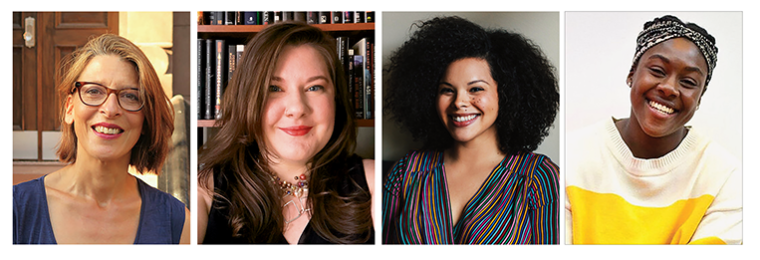While recent conversations about the lack of diversity in publishing have centered on the need to release more diverse books and hire more people of color within publishing houses, less mention has been made of a key set of gatekeepers to the industry: literary agents. In an industry in which unagented manuscripts are often either not accepted or not taken seriously, having an agent is invaluable in getting your foot in the door. But as the most recent Lee & Low Books survey of diversity in the industry shows, 76 percent of publishing industry professionals, including agents, identify as white, which in turn affects what books find representation. The Association of American Literary Agents (AALA) seeks to change this from the bottom up with initiatives to recruit talented BIPOC professionals into the field—and to retain them.

From left to right: Ayesha Pande, Katie Kotchman, Monica Odom, and Kayla Lightner. (Credit: Lightner: Kate Spence; Odum: Sylvie Rosokoff)
In December 2020, AALA announced the creation of Literary Agents of Change (LAoC), a charitable organization overseen by its Diversity, Equity, and Inclusion Committee, which was founded and is co-chaired by agent Ayesha Pande. The organization’s mission is to ensure social justice in literary agenting, and it offers two programs to this effect: an internship program and a mentorship program. “It’s super important for literary agents to reflect the true diversity of our population and country so that it’s not just books for the white gaze that are being picked up by agents, championed, and advocated for,” says Katie Kotchman, vice president of LAoC.
Internships, especially unpaid internships, have long been a part of the industry, a practice that clearly disadvantages certain groups. “It’s my personal view that the structure of publishing has always been created in a way that privileges white, middle-class, upper-class folks, on a fundamental level because of how much publishing pays,” says Kotchman. “If you’re expected to do an unpaid internship, who can afford those opportunities?” It is not unheard-of for aspiring agents to complete several internships, often unpaid, before they can be hired, or even taken seriously. LAoC aims to change attitudes about this standard practice and move toward an apprenticeship model through which the positions are paid and agencies are held accountable for the education and mentorship of each apprentice by giving them meaningful work instead of menial tasks like picking up dry cleaning. This summer the organization endeavored to offer $6,000 grants to no fewer than four students from diverse backgrounds from the City College of New York’s Publishing Certificate Program and Medgar Evers College for a ten-week internship with an AALA member agency. (In 2017, AALA launched a smaller version of the program exclusively with students from City College.) Direct donations from AALA members help fund the interns’ grants, ensuring that agents have a vested interest in the success of the program.
The students began their internships, remotely, in early June. Daily tasks include evaluating queries, reading manuscripts by signed authors and prospective clients, and providing feedback via reader reports. Kayla Lightner, an agent with Ayesha Pande Literary and the point person in charge of biweekly check-ins with this year’s cohort, says a constant theme she has heard from the interns is a curiosity about seeing the “nuts and bolts” of the industry from the inside. “I think there’s a recurring fascination seeing how agents have to think because [agenting] is its own mindset, where quality of writing is just one facet, and there are a thousand other things you have to consider as well.”
While the internship program focuses on recruitment, the mentorship program focuses on retention by partnering fifteen new agents with pairs of seasoned professionals for a year of monthly conversations about the ins and outs of their work. “The mentorship program aims to give [BIPOC people] support in their careers so that they want to stick around and have this feeling of inclusivity and equity,” says Monica Odom, president of LAoC.
Because publishing remains a small community of people in which hiring happens behind the scenes—jobs are often not posted and instead are filled through recommendations—building a network that the interns can turn to is integral to LAoC’s mission and the subject of constant conversation for the board. “Publishing is very much who you know. Otherwise you are just a cover letter and a résumé on a stack,” says Odom. “When we [the DEI Committee] meet, we discuss that as a group. Even though those conversations make people in the industry very uncomfortable, I think it’s those uncomfortable conversations that are helping us move things forward and make a change.”
The goal of the organization is to eventually fund-raise more outside its membership base to individuals and corporations and become a national program. “I am endlessly optimistic,” Odom says. “Internally we hope that when a survey [of representation] is done in the next five to ten years, we are seeing incremental growth.”
Enma Karina Elias is a writer living in the Pacific Northwest.








